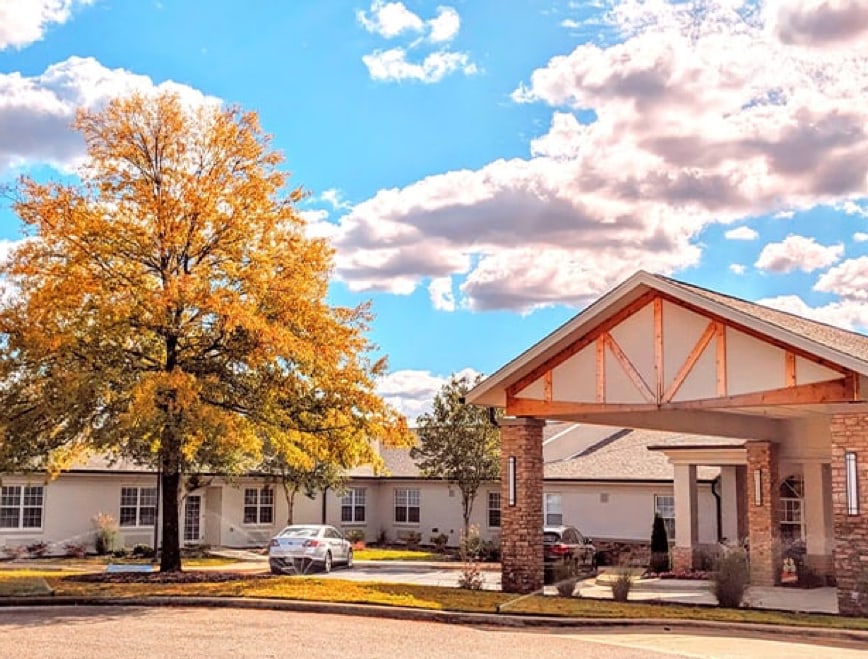Key Takeaways
- Assisted living supports older adults with daily tasks while promoting independence. However, memory care may be more appropriate as dementia progresses
- Memory care offers secured environments, therapeutic activities, and trained staff for individuals with cognitive conditions like dementia
- Choosing a community involves evaluating safety features, dementia-specific support, flexible care planning, and more
- An early plan and open conversation are key to preparing emotionally and practically for the move to senior living
- When preparing for the move, make sure you’re organizing belongings, packing familiar items, and planning logistics to reduce stress on moving day
- These steps help simplify the process and set your parent up for a successful transition to their new home in senior living
Easing the Transition to Senior Living for an Older Parent
Moving a parent with dementia is a significant step. If dementia is involved, it often becomes much more complicated. The transition period involves added layers of emotion, planning, and uncertainty, and it’s easy to feel overwhelmed with everything going on. Fortunately, with the right community, you can easily help your parent transition to their new home.
In most cases, when a parent with dementia needs extra support for daily life, it’s beneficial to go beyond assisted living and help them move into a supportive memory care community. Helping your parent transition to senior living starts with understanding their needs. Then, you can create a plan that supports their safety, routine, and emotional well-being. By breaking this process into smaller steps, you can approach it with greater clarity and compassion.
What Is Assisted Living and How Does It Help Seniors?
Assisted living is designed to help older adults stay independent. When a loved one values their independence but needs some everyday assistance, this lifestyle makes a big difference. Communities like ours provide a safe environment and help older adults with daily activities that give them trouble in their daily lives.
In many communities, care is personalized to meet individual needs. Some people may only need light assistance, while others benefit from more structured help throughout the day. That flexibility is part of what makes assisted living appealing.
However, assisted living isn’t one-size-fits-all. Services, amenities, and levels of support can vary. Knowing what your parent needs will help guide the search for the right community.
Can Someone with Dementia Live in Assisted Living?
In the early stages, some people living with dementia may still benefit from assisted living if the right structure and safety measures are in place. However, they will likely eventually need to transition to a more specialized level of care.
When dementia is involved, memory care is often a more appropriate solution. Memory care programs are designed specifically to support individuals with cognitive conditions like Alzheimer’s or dementia. They include features like secured environments, therapeutic programming, and staff trained to understand the symptoms of conditions that cause cognitive challenges.
How Can You Choose the Right Senior Living Community?
When selecting potential communities, you need to assess a range of factors. These include looking at whether the community offers the following:
- Secure environment with locked or monitored doors to reduce wandering risks
- Emergency systems in place for quick staff response
- Trained caregivers experienced in working with dementia
- Memory care programming that supports engagement and well-being
- Social engagement activities tailored to residents with cognitive conditions
- Flexible care planning to accommodate changes over time
Each of these plays a role in creating a safer, comfortable space where your parent can thrive.
Planning the Transition to Senior Living
Making this decision isn’t easy, and timing matters. If your parent is still at home but needs more help than you or others can provide, it’s time to open up the conversation about senior living. The sooner you discuss the option, the sooner you can find them their future home.
So, take the time to visit communities, ask questions, and pay attention to how staff interact with residents. Every step you take now helps lay the foundation for a more stable and supported move later.

Preparing Your Parent and Family for the Move
Getting ready for the move takes both emotional and practical planning. It’s normal to feel unsure—this is a big step. Whether your parent is moving to memory care or assisted living, involving your family helps create a smooth experience.
It helps to start by understanding what your parent values most. Is it routine? Privacy? Familiar faces? Use those insights to help them feel more grounded in the change.
Preparing the Home and Belongings for the Move
To prepare for the move, focus on organizing and decluttering your parent’s belongings. Break this down into several steps, because it takes time to fully pack a home. It helps to:
- Create a checklist to ensure important items, medications, and documents are included.
- Label boxes clearly to make unpacking easier and less stressful.
- Include keepsakes, framed photos, or meaningful decorations
- Double-check medications and store them in one place
- Bring familiar bedding to make the new space feel like home
- Create a small box of comfort items, like a blanket or book, for their first day
These steps take time, but they’re key to simplifying the move. Remember—the earlier you begin, the more time you give yourself for this task.
Moving Day: How to Make Things Easier for Yourself
Moving day can be a challenging time, but careful planning can help reduce stress. So, make sure that you:
- Schedule the move earlier in the day when energy is higher
- Avoid major holidays or events that might overwhelm your parent
- Use professional movers if possible to simplify logistics
- Bring snacks, water, and a familiar item to hold
- Keep voices calm and use positive language throughout the move
Moving is a stressful experience. However, a proper plan is key to lowering the risk of something going wrong.
Helping Your Parent Adjust After the Move
After the move, the adjustment period begins. This is where support really matters. Your parent is going to need some time to settle into their new home, so it helps to:
- Stick to a familiar routine
- Encourage your parent to try community programs
- Visit consistently, even if just for short periods
- Celebrate small wins, like participating in a new activity
- Talk openly with staff about what’s working or what may need tweaking
These steps help your parent adjust to their community.
Find a Community That Believes in Making a Difference
Helping a parent with dementia transition into assisted living is a meaningful and deeply personal journey. Planning ahead is the first step towards giving them the care they deserve. By researching your options, preparing thoughtfully, and choosing the right community, you’re making a big difference for your parent.Here at The Ridge at Grandview, we’re always happy to support your family in this process. Whether you’re just starting to ask questions or already exploring communities, our team is here to help. Book a tour with us today, and together, we can find your parent their new home.

















